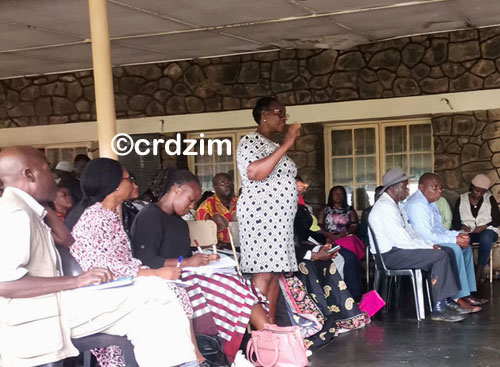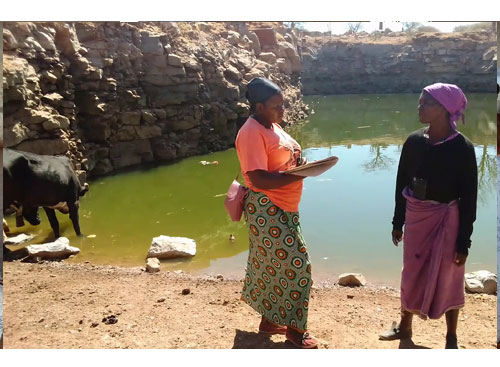WE at CRD affirm to world's principles on environment enshrined in our national laws which provide for:
• the right of every person to a healthy environment,
• to environmental protection for benefit of present and future generations,
• to secure ecologically sustainable development and the use of natural resources while promoting economic and social development.
Zimbabwe is endowed with vast minerals such as gold, diamonds, platinum, chrome, iron ore and lithium. The exploitation of these resources is fuelling pillaging as a result of archaic legislation, political patronage and policy inconsistency leaving communities wallowing in abject poverty. Although the mining sector has been contributing over 60% of export earnings, the economy has remained constrained amid rising foreign debt and unprecedented deterioration of public service delivery. The archaic Mines and Minerals Act (Chapter 21:05) of 1961 protects the miner from contract disclosure. In Manicaland Province where 90% of diamond revenue is derived, treasury realised a paltry US$194 million in revenue out of the US$1.7 billion of recorded alluvial diamond export sales between 2010 and 2014 despite government being the major shareholder in the mining ventures.
Political elites and securocrats exploited non-disclosure terms of mining contracting to grab majority shares in government controlled mining ventures and enriched themselves. Lack of public disclosure on beneficial shareholding has made it difficult for communities to hold miners accountable for environmental degradation and loss of livelihoods. Meanwhile, citizens living on communal land have no security of tenure as power over land is vested in the President according to section 4 of Communal Lands Act (Chapter 20:04) of 2004. The Mines and Minerals Act also vest powers on all mineral rights on the President. Section 26(a) of the Mines and Minerals Act states that all state land and communal land is land that is open to prospecting for minerals. Thus the supremacy of mining over the usufruct rights of citizens on customary land is reflected in the Mines and Minerals Act. In the event that communities refuse to consent to a mining development, their refusal has no merit as they are not landowners and not duly authorised to represent the President.
CRD is one of the Organisations that has been calling for government to reform the legal mining policy regime to conform to the Constitution of Zimbabwe, 2013 and international best practices. Thus, CRD has been calling for government to embrace Extractive Industry Transparency Initiative (EITI) and domestication of Africa Mining Vision for greater transparency and accountability in mining governance.
We at CRD have also been calling for government to domesticate the Kampala Convention for the Protection and Assistance of Internaly Displaced Persons to prevent the political, social, cultural, economic exclusion and marginalisation of citizens affected by development projects such as mining. We firmly believe the benchmarks set by the United Nations Guiding Principles on Business & Human Rights and the Free Prior and Informed Consent rights of Indigenous People must be respected in mining development. Resultantly, we have been strongly reminding government of the importance of abiding by these principles to protect human rights.
Government is yet to show commitment to fulfill the legislative agenda on mining reforms announced several times in Parliament. The quest by government to achieve an upper and middle income economic vision by 2030 is premised on National Development Strategy (NDS 1 and 2) running from 2021-2025 and 2026-2030. Although NDS1 recognises that weak governance policies in the mining sector have been the major limiting factor to achieve sustainable growth, there is lack of political will by government to expedite reforms. Amendments to critical policies such as the Mines and Minerals Act, Gold Trade Act and the Precious Stones Trade Act were important to enshrine best practices that guarantee accountability and human rights protection in the mining sector. Acceleration of mining developments by government through enhanced explorations, resuscitation of closed mines and opening of new mines underway in Zimbabwe is directed at stimulating economic growth.
Without reforms the revival of the mining sector has been marked by increased degradation on the environment, mining induced displacement, loss of livelihoods and economic marginalisation of host communities. Reforming the mining sector will enhance citizen participation and accountability in natural resource governance. Our advocacy work at CRD is therefore focused on increasing citizen participation to demand reforms and accountability in natural resource governance. We enhance citizen demands by undertaking various advocacy campaigns from grass roots to national level on public accountability around natural resources. Our campaigns encompass education awareness raising, community interface meetings, community coalitions and policy deliberative processes. Our advocacy is driven by evidence based research and information dissemination. In our campaigns we are also committed to collaborations with regional and international partners to strengthen people’s will for governments to adopt best practices for governing natural resources.



